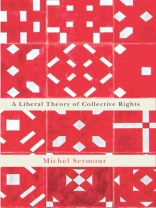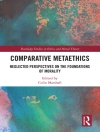Most states are multination states, and most peoples are stateless peoples. Just as collectives can behave as sovereign states only if they are recognized by the international community, liberal multination states must recognize stateless peoples in order to determine their political status within that state. There is, however, no agreement on the kind of principles that should be considered, especially under classical liberalism, which gives individuals preeminence over groups. Liberal theories that attempt to accommodate collective rights are often based on a comprehensive version of liberalism that subscribes to moral individualism. Within such a framework, they develop a watered-down concept of collective rights. In A Liberal Theory of Collective Rights Michel Seymour explores the theoretical resources of John Rawls’s political liberalism and shows that this particular approach can accommodate genuine collective rights. By Rawls’s account, Seymour explains, peoples are moral agents and sources of valid moral claims and are therefore entitled to collective rights. These kinds of rights translate, in the constitution of the multination state, to a true political recognition for stateless peoples. Ultimately, A Liberal Theory of Collective Rights answers three important questions: Who is the subject of collective rights? What is the object of collective rights? And can they be institutionalized in real politics?
Michel Seymour
Liberal Theory of Collective Rights [EPUB ebook]
Liberal Theory of Collective Rights [EPUB ebook]
Купите эту электронную книгу и получите еще одну БЕСПЛАТНО!
язык английский ● Формат EPUB ● ISBN 9780773552494 ● издатель McGill-Queen’s University Press ● опубликованный 2017 ● Загружаемые 3 раз ● валюта EUR ● Код товара 5835151 ● Защита от копирования Adobe DRM
Требуется устройство для чтения электронных книг с поддержкой DRM












